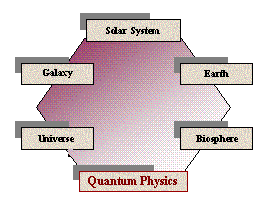

The code of Quantum Physics will some day help us to explain beyond our comprehension
of matter, energy, space and time. Astrophysics helps us to understand both the very small
and the very large.
E=MC2 is Einstein's basic theory of the relationship between energy and
matter. As matter and energy organize into different structures, other formulas apply not
all of which are well understood.
The concept of time is addressed in Einstein's theory of relativity. To use one of Dr.
Einstein's quotes, "When a man sits with a pretty girl for an hour, it seems like a
minute. But let him sit on a hot stove for a minute-and it's longer than any hour. That's
relativity."

There have been recent discoveries in the shape of the universe and patterns of galaxy
clusters. It is unknown if distant galaxies have any impact on every day life. The Big
Bang theory of the creation of the universe is studied more thoroughly with new technology
such as the Hubble telescope.

Large meteors from space may have rare but profound impact. On a daily basis, viewing
the stars is awe-inspiring. It helps us put our every day problems into perspective and is
a source of much mythology. Many cultures, such as the Greeks and Chinese conceptualized a
father in the heavens and a mother earth whose offspring came to earth.

Fluctuations in the quality and quantity of light as a result of the sun and the moon
clearly effect our mood. In general, light causes less sleep and an elevation of mood
while darkness causes increased sleep and lowers mood. This pattern is well recognized in
seasonal affective disorder in which short days and long nights cause a hibernation-like
state with over sleeping, increased appetite (particularly for carbohydrates) and a
dysphoric mood. In contrast, long days cause mania in some patients.
Lunacy is a term taken from the Bible. If the concept has lasted this long, there must
be some valid basis for this association. Some of my patients report insomnia when the
moon is full. Insomnia can be manic-inducing, thereby causing mania in a few susceptible
individuals. In primitive cultures without artificial lighting, women are noted to have a
tendency to ovulate when the moon is full. If all women were to ovulate when the moon is
full, could this create a social situation that some may describe as "lunacy"?
Perhaps there is merit in the old wives expression that anyone who shows her breasts to
the full moon will become pregnant; made possible through the combination of ovulation and
increased mania?
Light quality also fluctuates as the earth revolves around the sun. With the sun at a
lower angle on the horizon, there is more refraction; the lower end of the spectrum (red)
is more prominent. This reddened quality to light in the fall/winter may have some
implication on a variety of medical conditions including depression and migraine. Sun spot
cycles may cause fluctuations in our physical environment and weather cycles.
Astrology is an ancient belief system, which holds that the position of celestial
bodies effect human functioning and personality development.

The physical structure of the earth clearly impacts our functioning. This structure
includes geological, geographical, atmospheric, oceanographic, climatic and weather
systems.
Recent attention has been directed towards the integrity of the ozone layer, which
helps to stabilize our environment. Weather may effect our mood through seasonal changes,
humidity, temperature and fluctuations in barometric pressure. Weather systems with
extended periods of cloud cover may contribute to depression. In contrast, bright sun and
snow cover may have a relative mood-lifting effect.